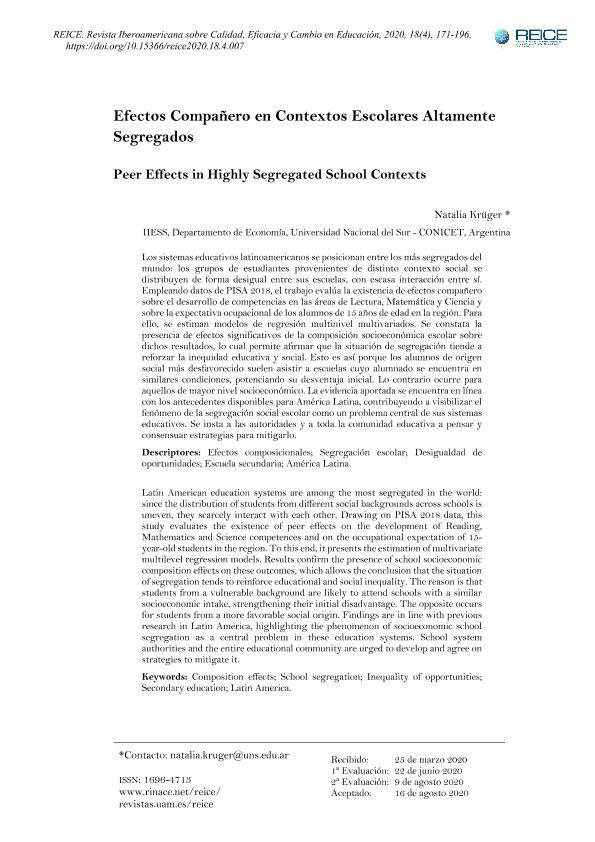Mostrar el registro sencillo del ítem
dc.contributor.author
Krüger, Natalia Soledad

dc.date.available
2021-11-01T14:59:05Z
dc.date.issued
2020-09-21
dc.identifier.citation
Krüger, Natalia Soledad; Efectos compañero en contextos escolares altamente segregados; Universidad Autónoma de Madrid; Revista Iberoamericana Sobre Calidad, Eficacia y Cambio en Educación; 18; 4; 21-9-2020; 171-196
dc.identifier.issn
1696-4713
dc.identifier.uri
http://hdl.handle.net/11336/145602
dc.description.abstract
Los sistemas educativos latinoamericanos se posicionan entre los más segregados del mundo: los grupos de estudiantes provenientes de distinto contexto social se distribuyen de forma desigual entre sus escuelas, con escasa interacción entre sí. Empleando datos de PISA 2018, el trabajo evalúa la existencia de efectos compañero sobre el desarrollo de competencias en las áreas de Lectura, Matemática y Ciencia y sobre la expectativa ocupacional de los alumnos de 15 años de edad en la región. Para ello, se estiman modelos de regresión multinivel multivariados. Se constata la presencia de efectos significativos de la composición socioeconómica escolar sobre dichos resultados, lo cual permite afirmar que la situación de segregación tiende a reforzar la inequidad educativa y social. Esto es así porque los alumnos de origen social más desfavorecido suelen asistir a escuelas cuyo alumnado se encuentra en similares condiciones, potenciando su desventaja inicial. Lo contrario ocurre para aquellos de mayor nivel socioeconómico. La evidencia aportada se encuentra en línea con los antecedentes disponibles para América Latina, contribuyendo a visibilizar el fenómeno de la segregación social escolar como un problema central de sus sistemas educativos. Se insta a las autoridades y a toda la comunidad educativa a pensar y consensuar estrategias para mitigarlo.
dc.description.abstract
Latin American education systems are among the most segregated in the world: since the distribution of students from different social backgrounds across schools is uneven, they scarcely interact with each other. Drawing on PISA 2018 data, this study evaluates the existence of peer effects on the development of Reading, Mathematics and Science competences and on the occupational expectation of 15-year-old students in the region. To this end, it presents the estimation of multivariate multilevel regression models. Results confirm the presence of school socioeconomic composition effects on these outcomes, which allows the conclusion that the situation of segregation tends to reinforce educational and social inequality. The reason is that students from a vulnerable background are likely to attend schools with a similar socioeconomic intake, strengthening their initial disadvantage. The opposite occurs for students from a more favorable social origin. Findings are in line with previous research in Latin America, highlighting the phenomenon of socioeconomic school segregation as a central problem in these education systems. School system authorities and the entire educational community are urged to develop and agree on strategies to mitigate it.
dc.format
application/pdf
dc.language.iso
spa
dc.publisher
Universidad Autónoma de Madrid

dc.rights
info:eu-repo/semantics/openAccess
dc.rights.uri
https://creativecommons.org/licenses/by-nc-nd/2.5/ar/
dc.subject
EFECTOS COMPOSICIONALES
dc.subject
SEGREGACIÓN ESCOLAR
dc.subject
DESIGUALDAD DE OPORTUNIDADES
dc.subject
ESCUELA SECUNDARIA
dc.subject
AMÉRICA LATINA
dc.subject.classification
Otras Economía y Negocios

dc.subject.classification
Economía y Negocios

dc.subject.classification
CIENCIAS SOCIALES

dc.title
Efectos compañero en contextos escolares altamente segregados
dc.title
Peer effects in highly segregated school contexts
dc.type
info:eu-repo/semantics/article
dc.type
info:ar-repo/semantics/artículo
dc.type
info:eu-repo/semantics/publishedVersion
dc.date.updated
2021-08-20T19:38:02Z
dc.journal.volume
18
dc.journal.number
4
dc.journal.pagination
171-196
dc.journal.pais
México

dc.description.fil
Fil: Krüger, Natalia Soledad. Consejo Nacional de Investigaciones Científicas y Técnicas. Centro Científico Tecnológico Conicet - Bahía Blanca. Instituto de Investigaciones Económicas y Sociales del Sur. Universidad Nacional del Sur. Departamento de Economía. Instituto de Investigaciones Económicas y Sociales del Sur; Argentina
dc.journal.title
Revista Iberoamericana Sobre Calidad, Eficacia y Cambio en Educación
dc.relation.alternativeid
info:eu-repo/semantics/altIdentifier/doi/https://doi.org/10.15366/reice2020.18.4.007
dc.relation.alternativeid
info:eu-repo/semantics/altIdentifier/url/https://revistas.uam.es/reice/article/view/reice2020_18_4_007
Archivos asociados
